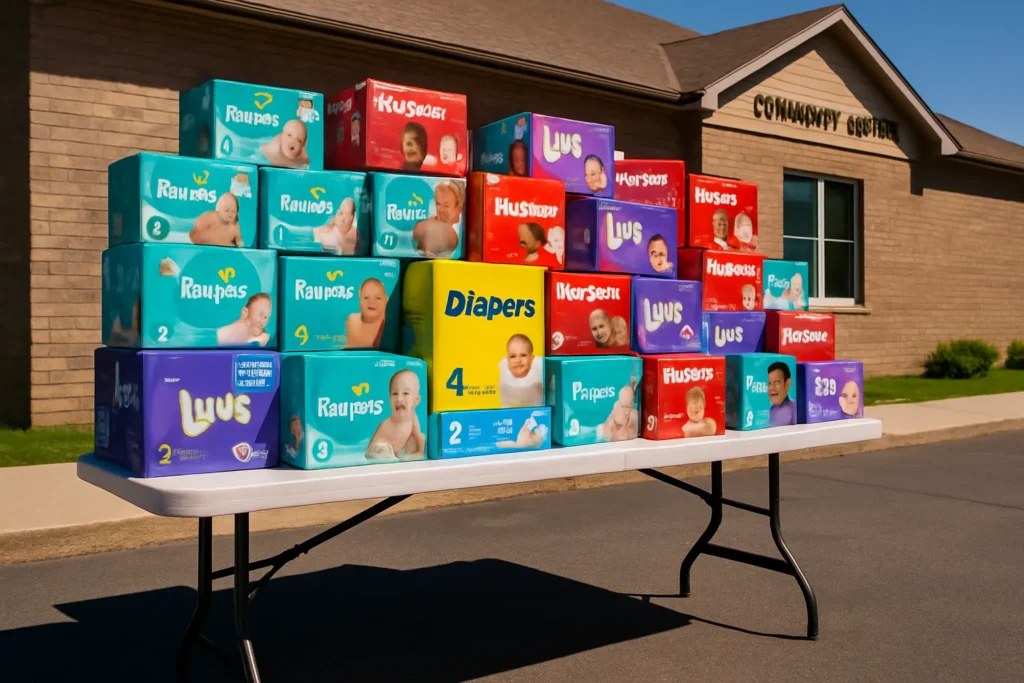Top Coverage News — Dateline: May 6, 2025. The humble diaper, long a silent workhorse of infant hygiene, has detonated into the center of municipal politics this week as supply tables empty faster than volunteers can restock them. What began as a routine charity collection has morphed into a full-scale governance crisis, complete with emergency budgets, rival task forces, and the faint rattle of recall chatter.
From Spare Change Jars to Runaway Convoy Lines
At precisely 7:02 a.m. Tuesday, volunteers at the first of three pop-up diaper checkpoints reported a line of minivans stretching four city blocks. “We planned for steady traffic,” said drive coordinator Arlena Juarez, “not a supply convoy worthy of wartime evacuation.” The surge forced organizers to activate the rarely used Priority Parcel Protocol — rerouting late-morning donations to a hastily fenced overflow lot behind the middle-school gym.
Local constable Rex Dayton redirected patrol units from routine parking enforcement to diaper traffic flow. “Every cruiser we had was reassigned,” he confirmed, eyes fixed on his radio. “If we don’t maintain lane discipline, this town could break its axle before noon.” School buses were held an extra 12 minutes while the convoy passed, sparking a district-wide bell schedule revision and subsequent union complaint.
Witnesses described brief scuffles over size-6 pull-ups. Councillor Frieda Hall called the scene “a powder keg of unmet need.” Hall later cited a World’s Largest Diaper Drive statistic showing one in two U.S. families struggle to secure diapers, warning, “That 50% lives on our streets, in our pews, on our bleachers.”
Emergency Funding, Splinter Committees, and a Threatened Budget Veto
By noon, Mayor Luther Nance invoked Section 14-B of the town charter, freeing $18,400 in contingency funds for immediate diaper procurement. The move inflamed the fiscally cautious “Diaper Neutrality Caucus,” who argued any single-item allocation sets “a perilous precedent for commodity-specific bailouts.” Caucus leader Inez Mercado demanded an itemized impact report within 48 hours or promised to stall next quarter’s road-salt appropriation.
Finance Director Cecil Boone countered that infants present a clear and present public-health imperative. “We pave asphalt to keep tires safe,” Boone said. “We buy diapers to keep babies safe. Both prevent pile-ups.” Late-afternoon whispers suggest an Override Coalition — an unlikely alliance of PTA delegates, childcare operators, and the senior bowling league — may force a super-majority vote as early as Friday.
Meanwhile, regional suppliers blame national pressure. HomeAid Orange County, now in its own month-long campaign, reports a goal of collecting over one million items. “Their bulk purchasing vacuumed up every bundle from Fresno to Flagstaff,” complained warehouse manager Dale Borkin, speaking over the roar of forklifts. “We’re left bartering with gas stations for whatever’s behind the counter.”

A Town’s Social Fabric Pulled Tight at the Seams
Social media fissures appeared within hours of the mayor’s decree. The private “Better Bottombabies” Facebook group ballooned from 80 members to 1,700 overnight, fueling speculation of a grassroots lobby. Screenshots show calls for a midnight “stroller-in” protest outside Town Hall, complete with synchronized lullabies and glow-stick pacifiers. PTA president Vera Polzin denied direct involvement but conceded, “Parents have discovered their sleepy-time playlists double as protest anthems. The acoustics could be historic.”
Not all factions align on the same diaper doctrine. The “Reusable First Front” argues the drive neglects cloth alternatives, claiming environmental costs will haunt future budgets. Conversely, the “Emergency Absorbency League” dismisses cloth as “a privilege of laundry-secure households.” A joint mediation session mediated by librarian Eldon Price dissolved after five minutes when both camps disputed the definition of “biodegradable snap-insert.”
The conflict has reached youth sports as well. Saturday’s Little League doubleheader may be postponed to reserve the field house as a neutral drop-site. Coach Jill Monroe warned, “If t-ball schedules fall, confidence in summer rec programming goes with it. We’re balancing inning counts and infant rashes on the same clipboard.”
State and Federal Reverberations Expand the Blast Zone
Policy watchers note that diaper logistics now bleed into Medicaid debates. Tennessee and Delaware recently announced pilot programs offering free diapers to qualifying families. Our own state legislature, sensing political capital, drafted the “Infant Commodities Stabilization Act.” If passed, municipalities like ours would receive performance-based diaper grants; failure to distribute within 48 hours could trigger claw-backs large enough to jeopardize library roof repairs.
County Health Officer Dr. Lenora Vale framed the urgency bluntly: “A wet diaper raises infection risk. Infection inflates ER visits. ER visits swell Medicaid claims. Claims hit county coffers. This is budget triage, not coddling.” Vale’s briefing included a slide depicting the town treasury as a literal leaky diaper — a metaphor that drew bipartisan applause and a request for public copies.
Even local credit unions sense opportunity. Royal Credit Union, fresh off announcing a month-long drive in Wisconsin, offered consulting on “bank-backed absorbency bonds” — a niche municipal note pegged to diaper inventory thresholds. Economic Development Director Harris Quan said the proposal “could securitize our compassion,” though he admitted paperwork would “require more wipes than any of us care to count.”
Where the Drive Rolls From Here
Tonight, Town Hall hosts what is billed as a “Diaper Convergence Hearing.” Seating charts reveal overflow rooms, sign-up sheets, and a color-coded badge system to separate donors, recipients, and observers. Security asks attendees to limit banners to 24 inches high and refrain from weaponizing diaper pins.
Practical Tips for Residents
- Donate sealed packages only. Open bags trigger health-code audits and could stall the entire drive.
- Check size needs in real time. A live spreadsheet on the town website refreshes every 15 minutes.
- Expect rolling detours. Main Street may convert to one-way traffic during peak drop-off windows.
Should negotiations collapse, contingency plans include deploying the high-school marching band to keep queue morale high and activating the parks department’s snow-fencing to cordon off rogue diaper piles.
The next 48 hours will decide whether this community emerges unified under a banner of fresh powder or splinters into rival camps of absorbent ideology. For now, every crinkle, every tab, and every size-six pull-up carries the weight of public faith in local government.
—End of Dispatch


